Fact file:
Matriculated: 1904
Born: 4 May 1885
Died: 5 July 1917
Regiment: Royal Field Artillery
Grave/Memorial: Fosse No. 10, Communal Cemetery (Extension): I.D.6
Family background
b. 4 May 1885 as the only son of Thomas Edmund Powell (1851–1901) and Kate Millicent Powell (née Overbury) (1861–1935) (m. 1881). At the time of the 1891 Census, the family were living at Tower Hill, Dorking (five servants); the same address in 1901 (six servants); and in 1911 at 34 Hertford Street, Mayfair (six servants). They later moved to “Oakridge”, Goodwyn’s Place, Dorking, Surrey.
Parents and antecedents
Maurice Powell is not related to either E.I. Powell or G.F.W. Powell both of whom were killed in action.
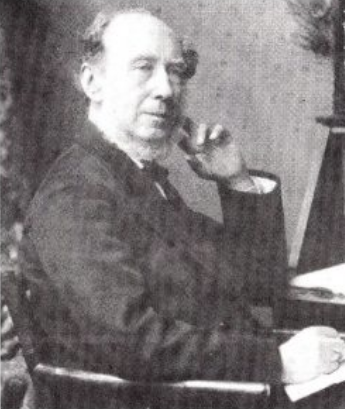
Thomas Wilde Powell
(Dorking and Leatherhead Advertiser)
Powell’s paternal grandfather was Thomas Wilde Powell (1818–97), who was born in Leeds and practised there as a solicitor. He moved to London and became a successful banker and broker. In 1882 he bought the Pen-y-bont Colliery in Abertillery, which was then known as Powell’s Tillery Colliery. He also paid to have the Tillery Reading Rooms built in 1884 and the Tillery Institute in 1898, although he died before the completion of the latter. He was partner in the firm Heseltine, Powell and Co. Stockbrokers, and had property in Western Australia. At his death his personal estate was valued at £196,159 18s. 5d. (roughly £15m in 2017), much of it coming from his investments in American railways. He was an early member of the Society for the Protection of Ancient Buildings, and the house he had built in Guildford, Piccards Rough, was an early example of the Arts and Crafts Style.
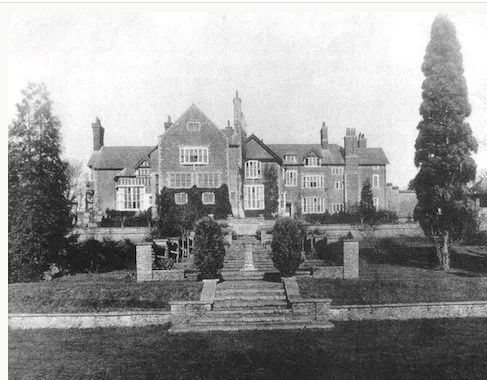
Piccards Rough (c.1914); in 1915 it became an auxiliary Military Hospital
Powell’s paternal grandmother was Mary Elizabeth Marten (1826–71), the daughter of a stockbroker.
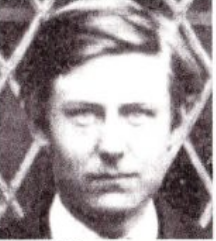
Thomas Edmund Powell c.1875
Dorking and Leatherhead Advertiser
Powell’s father, Thomas Edmund, was a scholar at Oriel College, Oxford, getting a 2nd class in the Final Classical School and taking his BA in 1880. He became a stockbroker, and director and chairman of Tillery Colliery after his father’s death. In 1898 together with his sister Lady Christiana Herringham (1852–1929) he opened the new Tillery Institute. On his death in 1901 his brother, Dr Herbert Andrews Powell (1864–1950), followed him as the chairman of Tillery Colliery. He was a local philanthropist and the Powell Corderoy Primary School in Dorking is named for his generosity. Like his father, he was interested in the Arts and Crafts movement and commissioned Goodwyns Place, Dorking, an Arts and Crafts country house designed by his sister Mary’s (1854–1907) husband, Hugh Thackeray Turner (1853–1937).
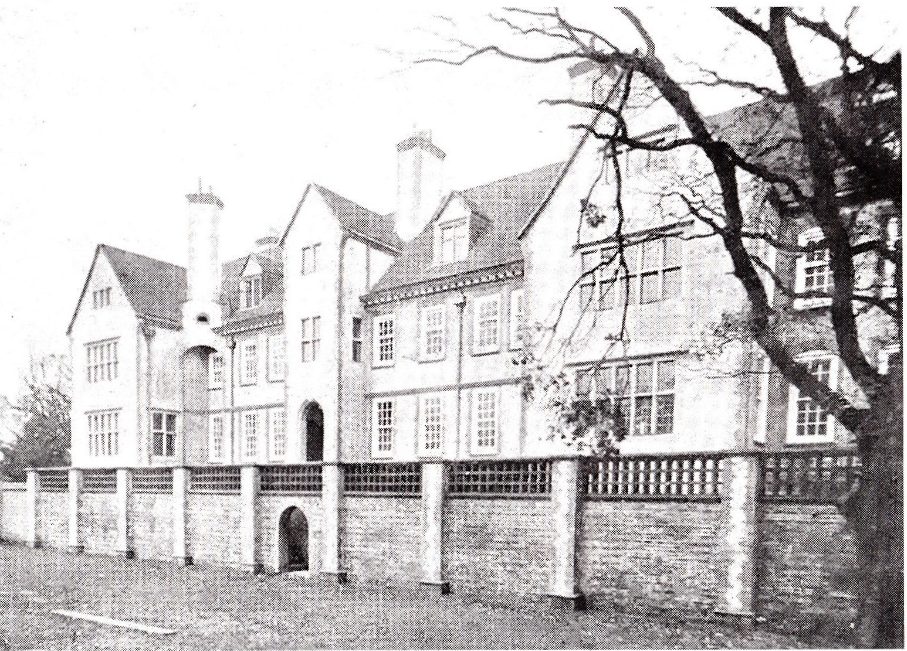
Gladwyns Place
(Dorking and Leatherhead Advertiser)
Powell’s maternal grandfather was Benjamin Fox Overbury (1825–1903), a woolbroker originally from Bath, who worked for a while in Huddersfield before moving to London. Powell’s maternal grandmother was Mary Marshall, whose father was given as John Robert Marshall (deceased) in her entry in the marriage register but as Joseph Marshall of Limerick in newspaper accounts of her wedding; the latter is probably correct. She first married Jean Francois Baumann (1808–56) in 1854. Baumann was a celebrated musician, being a member of the Royal Italian Opera and Philharmonic Concerts orchestras. He was also a member of the Ancient Concerts orchestra for over 20 years and was known for his performances on the hautboy. After his death and their short marriage she married Benjamin Fox Overbury in 1858.
Maurice’s cousin Ruth Turner (1892–1942), daughter of his father’s sister Mary, married George Herbert Leigh Mallory (b. 1886, d. 1924 on Mount Everest).
Siblings and their families
Brother of:
(1) Dorothea (1881–1941); later Lockhart after her marriage in 1915 to John Leonard Lockhart (1885–1962); one son, two daughters;
(2) Helen Margaret (“Peggy”) (1887–1953); later Gregson after her marriage in 1911 to Captain Geoffrey Kirkes Gregson, RFA (later DSO) (b. 1881, d. 1952 in Kenya)’; one son and (probably) other children.
John Leonard Lockhart was a regular soldier who retired as Major, and the son of a regular soldier who had retired as Lieutenant-Colonel.
Geoffrey Kirkes Gregson was the son of a regular soldier who retired as a Major in the Royal Engineers. He himself was a regular soldier who went to the front on 17 July 1915 and served in the Royal Field Artillery before working for the Ministry of Munitions. He retired as a Colonel. At their wedding Helen Margaret was, unusually for that time, given away by her mother; whereas Maurice gave Dorothea away some years later.
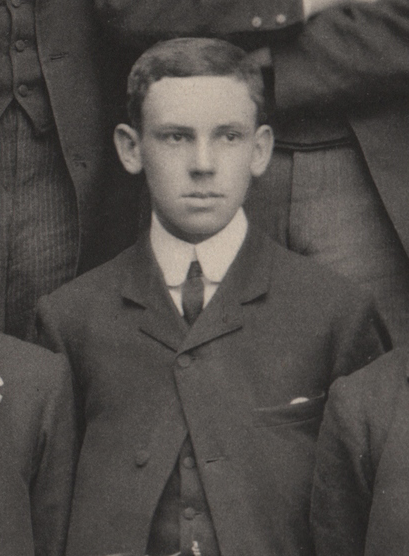
Maurice Powell
(Courtesy of Uppingham School Arcives)
Education and professional life
Powell was educated at Miss Bradshaw’s School, Hog’s Back, Dorking, Surrey, from c.1892 to 1899 before becoming a Foundation a Scholar at Uppingham School, Rutland, from 1899 to 1904. He was elected to a Demyship in Classics at Magdalen on the same day as E.H.L. Southwell and matriculated on 18 October 1904, having been exempted from Responsions. He took the First Public Examination in Trinity Term 1905 and Hilary Term 1906, when he was awarded a 2nd in Classics Moderations. In Trinity Term 1908 he was awarded a 2nd in Literae Humaniores and, together with J.L. Johnston, he took his BA on 22 October 1908. Warren wrote:
without being exactly conspicuous he was well-known, and much liked. Amongst other things he was a good musician, and always ready to turn his talents to giving pleasure to others, whether at the College, or afterwards at the College Mission, where he resided for a considerable time.
He was called to the Bar in 1912.
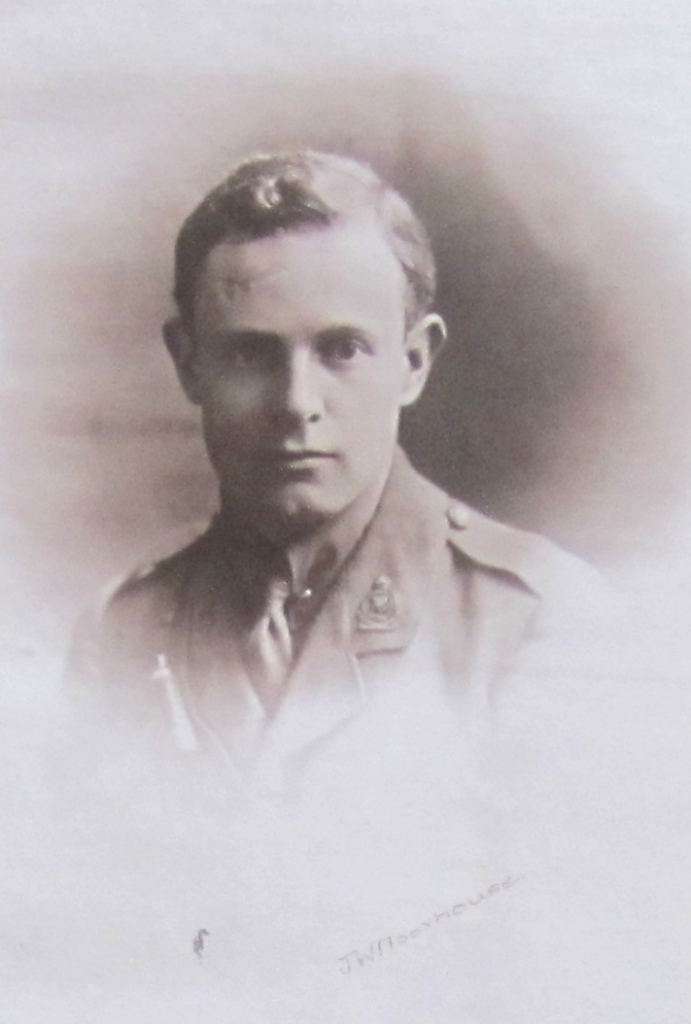
Maurice Powell
Military and war service
Having been a member of the Oxford University Officers’ Training Corps, Powell was a keen Territorial and was commissioned on 22 January 1913 as a Second Lieutenant in the Surrey Yeomanry. He was on manoeuvres with this Regiment when war broke out. For the first year and a half of the war, he was personal aide-de-camp (ADC) to the General Officer Commanding the Home Counties Territorial Division (later the 67th (2nd Home Counties) Division) (London Gazette, no. 28,885, 31 August 1914, p. 6,886). But when the Division was broken up and the General and his staff were kept in England to command the new Division that was taking shape, Powell became restless, declined promotion in the Artillery Brigade which was attached to the new Territorial Division and with which he served for several months, and asked his superior to help him get a transfer to the Regular Royal Field Artillery (RFA) as he wanted to go to the front.
He finally obtained his transfer in July 1916 – to the (Regular) 6th Battery, 14th Brigade, RFA – and was sent on a course of instruction at Shoeburyness, where he passed out top with over 95% of marks. He then went down to Codford, on Salisbury Plain, where he was promoted Lieutenant on 26 August 1916 (London Gazette, no. 29,723, 25 August 1916, p. 8,399), and from there, in November 1916, he proceeded to his Battery in France, where, according to his medal card, he had first set foot on 26 January 1916. But this is probably an error, unless he went there in his capacity as the ADC to a General. Powell was very successful in his new role, and in a letter to President Warren of 5 August 1917 his father said of him:
He was extremely keen about gunnery & quite unusually capable of it: One of his C.O.’s said he was “quite the best officer in the Battery”: He never complained for he said when he went out that nothing would induce him to write home & say “it was Hell” as so many do. He wanted to “pull his whole weight” & he told me it was a “good life.”
Meanwhile, 68th Battery had been stationed at Mailly-Maillet, about three miles north of Albert, and on 1 and 2 July 1916, the first two days of the Battle of the Somme, it had fired in support of the 4th Division’s unsuccessful attack on the German positions at Beaumont Hamel. The Battery then withdrew c.12 miles westwards to Amplier and Orville, two villages on the River Authie just to the south-east of Doullens. By 1 October 1916, 14th Brigade RFA was at Guillemont, two miles west of Combles and just too far south to be taking part in the opening of the Battle of Transloy Ridge (1–18 October); and by February 1917 the 14th Brigade RFA was near Péronne. We know no more about Powell’s subsequent activities except that he was a very committed, reliable and skilful artillery officer and that he showed special gallantry on more than one occasion. Major Walker Stuart Wingate Gray (1890–1977), the Commanding Officer of another Battery in the 14th Brigade, wrote the following to Powell’s father about his son’s competence:
He was an exceptionally good gunner & took a tremendous interest in his work. I never met anyone with such a fine, definite purpose & conscientiousness to see this war through properly for England: Not long ago I had occasion to bring his name to notice for a fine gallant act: My Battery was heavily shelled & some ammunition was blowing up; he told me about it, as he was coming past at the time; and before I could get to the place with my men, he was there, coolly working away himself, without thinking of his own personal danger, pulling away the burning boxes & putting the fire out. Very gallant conduct indeed; he saved my gun & ammunition & beyond doubt many casualties.
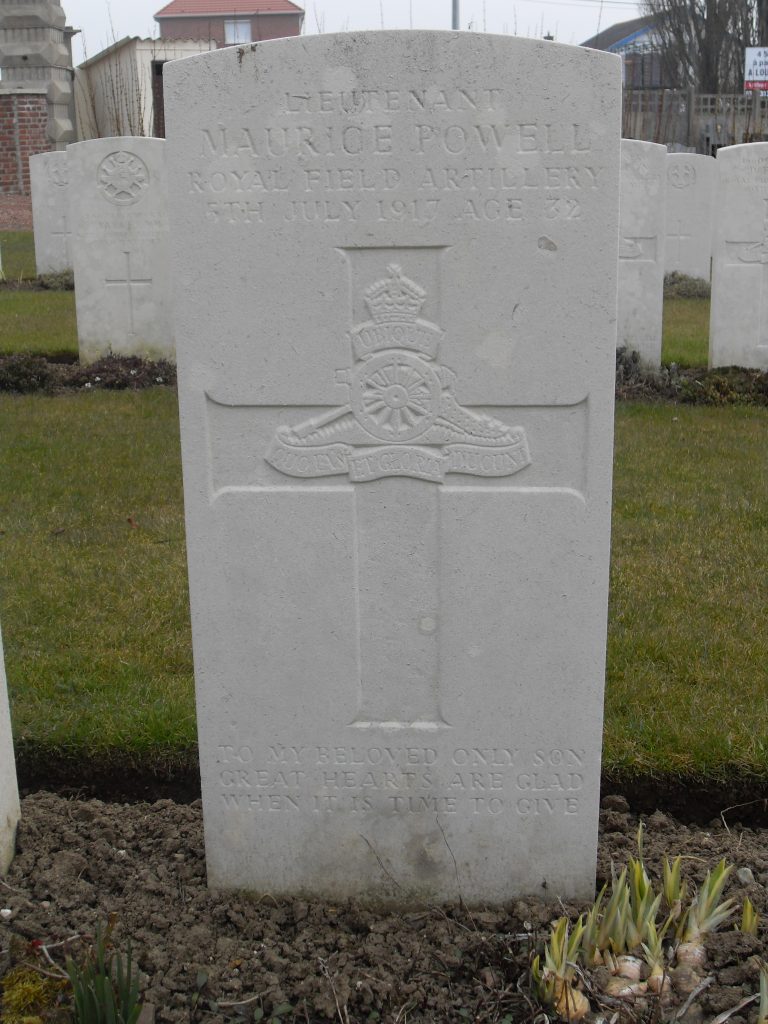
Fosse No. 10 Communal Cemy (Extension), Sains-en-Gohelle; Grave 1.D.6.
Powell, aged 32, and his comrade, Acting Captain William Charles Count (c.1877–1917), were killed in action by a stray shell on 5 July 1917 near Lens, when Powell was controlling the fire of his guns in the section that he was commanding. He and Court are buried in Fosse No. 10 Communal Cemetery (Extension), Sains-en-Gohelle, Graves I.D.6 and l.D.7 respectively. Powell’s headstone is inscribed: “To my beloved only son. Great hearts are glad when it is time to give”. The second sentence is a quotation from E.M.Tenison, A Short History of the Order of Saint John of Jerusalem (Cowes: The Bantam Press, 1922) and refers to the humanitarian work of Adeline, Duchess of Bedford (1852–1920), Chair of the Ladies Committee of the Order of St John during the Great War. Powell left £4,722 12s 1d.
Bibliography
For the books and archives referred to here in short form, refer to the Slow Dusk Bibliography and Archival Sources.
Printed sources:
[Anon.] ‘Death of Mr T.E. Powell’, Dorking and Leatherhead Advertiser (19 January 1901) no. 721, p. 5.
[Anon.], ‘Lieutenant Maurice Powell, RFA’ [obituary], The Times, no. 41,542 (28 July 1917), p. 9.
[Thomas Herbert Warren], ‘Oxford’s Sacrifice’ [obituary], The Oxford Magazine, 36, no. 1 (19 October 1917), p. 9.
[Anon.] ‘The two untimely deaths that denied town a richer history’, Dorking and Leatherhead Advertiser (6 July 2017).
Archival sources:
MCA: PR 32/C/3/969–970 (President Warren’s War-Time Correspondence, Letters relating to M. Powell [1915]).
OUA: UR 2/1/55.
WO95/455.
WO95/1466.
